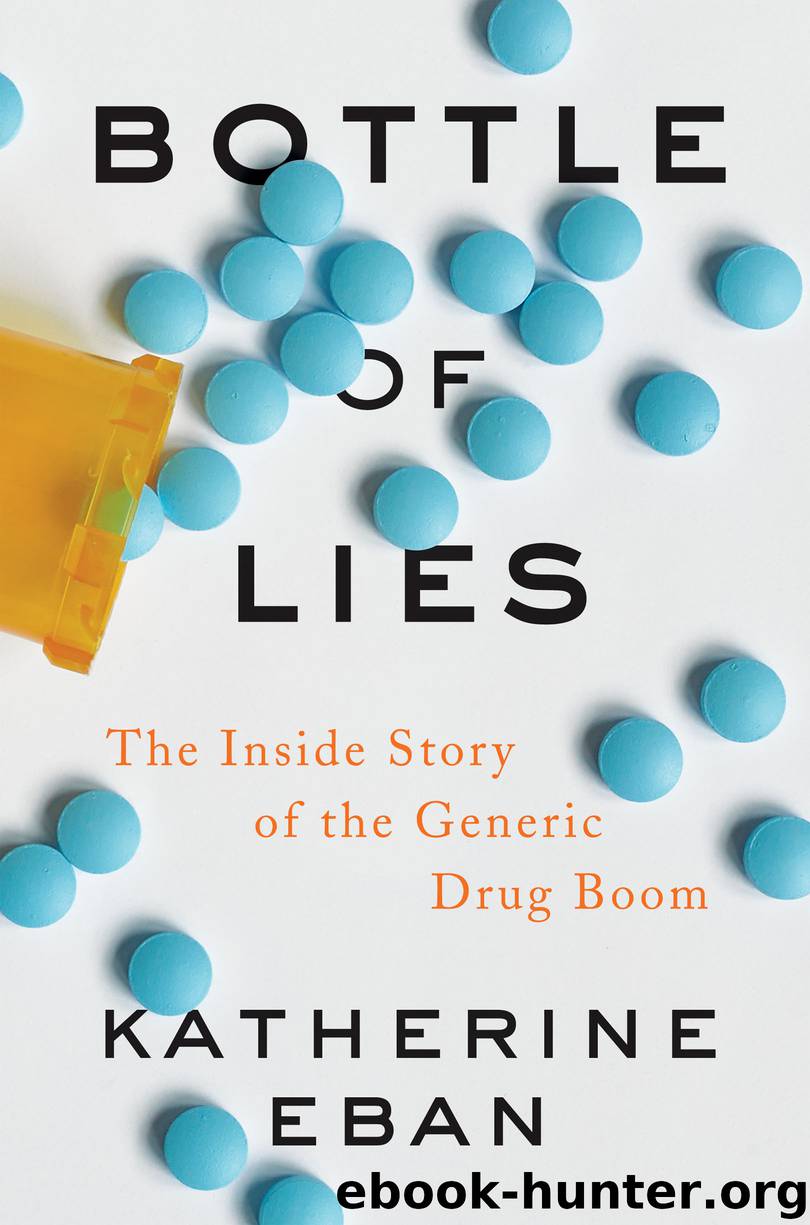Bottle of Lies by Katherine Eban

Author:Katherine Eban
Language: eng
Format: epub
Publisher: HarperCollins
Published: 2019-03-30T04:00:00+00:00
Chapter 21
A Deep, Dark Well
1998–2010
Durham, North Carolina
For three decades, Joe and Terry Graedon had been on the side of patients. The husband-and-wife duo, a pharmacologist and a medical anthropologist, respectively, wrote a syndicated newspaper column and hosted a National Public Radio program, The People’s Pharmacy. Over the years, as they worked to empower and educate patients in their search for cures, the Graedons held a bedrock assumption: the FDA was a competent regulator whose claims could be believed.
Even during the dark days of the generic drug scandal in the late 1980s, the Graedons expressed confidence that the FDA’s “exhaustive analyses” had found no problems that would endanger consumers; they remained staunch advocates for generic drugs. “We were steadfast in maintaining they were identical and you would have to be a total idiot to pay for a brand-name drug when a generic was available,” Graedon recalled.
A chance encounter at their attorney’s office a decade later sparked the Graedons’ first real doubts about just how exhaustive the FDA’s analyses were. There, an employee whose young son had attention deficit disorder told them, “When he goes off to school on Ritalin, he does very well.” But when he was on the generic, the teachers complained about his ability to function for the same length of time. In the late 1990s, the Graedons started to receive letters from readers and radio listeners recounting bad experiences with a range of generic drugs. One patient had suffered anxiety and insomnia after switching to generic Synthroid: “I was sweating more than usual and my heart felt as though it would pound out of my chest.” Another patient had become manic after taking generic Fioricet for a migraine: “I was stimulated beyond belief—typing letters and sending faxes at 3:00 a.m.”
The Graedons published these cases in a 1998 newspaper column, raising the question of “how well the FDA monitors generics after they have been approved.” By 2002, Joe Graedon had contacted the FDA and connected with the director of the Office of Generic Drugs, Gary Buehler. It was the start of a fraught communication that spanned years.
Before long, the People’s Pharmacy website became a clearinghouse for patients wrestling with terrible symptoms after a switch to generic drugs. Patients wrote in, desperate for answers. Graedon forwarded the complaints to Buehler at the FDA. Between 2007 and 2009, he relayed complaints about at least twenty different drugs, believing that highly placed officials would want to know what patients were experiencing.
In a January 2008 email to Robert Temple, deputy director for clinical science at the FDA’s Center for Drug Evaluation and Research, Graedon forwarded a complaint about generic Dilantin, an epilepsy drug: “After being on 300 mg. of dilantin for more than 20 years, I tried the cost cutting measure of replacing it with the generic. Numerous times I had seizures.” Graedon wrote to Buehler about the complaint, “This is most worrisome. We trust you are taking this as seriously as we are.”
As Graedon scrutinized the FDA’s standards for bioequivalence and the
Download
This site does not store any files on its server. We only index and link to content provided by other sites. Please contact the content providers to delete copyright contents if any and email us, we'll remove relevant links or contents immediately.
The Poisoner's Handbook by Deborah Blum(1659)
Bottle of Lies by Katherine Eban(1466)
The Vaccine Race by Meredith Wadman(1350)
Missing Microbes by Martin Blaser(1315)
Mycelium Running: How Mushrooms Can Help Save the World by Paul Stamets(1284)
Pharmacy Practice and The Law by Richard Abood(1252)
The Doors of Perception and Heaven and Hell by Aldous Huxley & Aldous Huxley(1233)
28 Seconds by Michael Bryant(1200)
Decisive by Chip Heath(1198)
Steroids: History, Science, and Issues by Standora Joan E.; Bogomolnik Alex; Slugocki Malgorzata(1190)
McGraw-Hill Nurses Drug Handbook by Patricia Schull(1182)
Ganja Yoga by Dee Dussault(1171)
What's Making Our Children Sick? by Michelle Perro(1153)
The Doors of Perception: Heaven and Hell (thINKing Classics) by Aldous Huxley(1146)
Complete Guide to Prescription & Nonprescription Drugs 2014 by H. Winter Griffith(1074)
Stealing Fire: How Silicon Valley, the Navy SEALs, and Maverick Scientists Are Revolutionizing the Way We Live and Work by Steven Kotler & Jamie Wheal(1072)
Trip by Tao Lin(1043)
Anatomy of an Epidemic by Robert Whitaker(971)
Cannabis for Chronic Pain by Rav Ivker(951)
